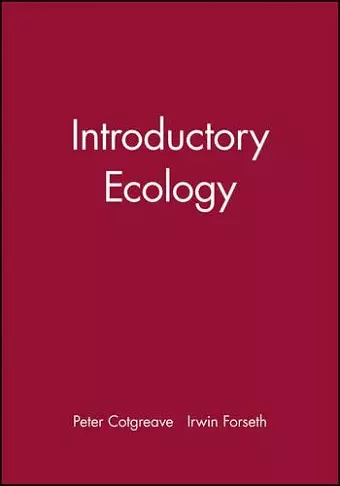Introductory Ecology
Peter Cotgreave author Irwin Forseth author
Format:Paperback
Publisher:John Wiley and Sons Ltd
Published:5th Feb '02
Currently unavailable, and unfortunately no date known when it will be back

In this age of increasing human domination of the Earth's biological and physical resources, a basic understanding of ecology is more important than ever. Students need a textbook that introduces them to the basic principles of ecological science, one that is relevant to today's world, and one that does not overwhelm them with detail and jargon.
Peter Cotgreave and Irwin Forseth have designed this book to meet the needs of these students, by providing a basic synthesis of how individual organisms interact with their physical environment, and with each other, to generate the complex ecosystems we see around us. The unifying theme of the book is biodiversity-its patterns, causes, and the growing worldwide threats to it.
Basic ecological principles are illustrated using clearly described examples from the current ecological literature. This approach makes the book valuable to all students studying ecology. Examples have been chosen carefully to represent as wide a range of ecosystems (terrestrial and aquatic, northern and southern hemisphere) and life forms (animal, plant and microbe) as possible. Particular attention is paid to consequences of global change on organisms, populations, ecological communities and ecosystems. The end result is a text that presents a readable and persuasive picture of how the Earth's natural systems function, and how that functioning may change over the coming century.
Features include:
· strong coverage of applied and evolutionary ecology
· applications of ecology to the real world
· a question-orientated approach
· the only comprehensive treatment of ecology written for the introductory student
· an emphasis on definitions of key words and phrases
· an integration of experimental, observational and theoretical material
· examples drawn from all over the world and a wide variety of organisms
· a logical structure, building from the response of individual organisms to physical factors, through population growth and population interactions, to community structure and ecosystem function
· suggested further reading lists for each chapter
· boxes to explain key concepts in more depth
· dedicated textsite featuring additional information and teaching aids www.blackwellpublishing.com/cotgreave
Peter Cotgreave is an animal ecologist who has worked for the University of Oxford and the Zoological Society of London. His...
'I appreciated the refreshing narrative style of presentation. The reader is engaged in the material, which is well organized and clearly presented. There is a nice assortment of examples provided to illustrate and reinforce each point. The authors appear to have succeeded in reaching their intended audience.'
"Good introductory ecology texts are rare. They should stimulate further inquiry and should be topical, clear and exciting. They should be comprehensive enough to include the major principles without requiring further resources, yet should be well referenced. Examples should be relevant to the student's local environment, while reflecting biogeographical regions and world ecosystem types. Introductory Ecology comes close to satisfying all these requirements...Ecology texts often fail to travel across the Atlantic, but this volume includes authors from the US and UK - and a breadth of relevant examples given in an American textbook style - and is in my view the best to be found outside Open University texts...Overall, this is a good introduction to what is acknowleged to be a complex subject." Tony Andrew, University of Ulster, Coleraine, Times Higher Education Supplement, May 2003
ISBN: 9780632042272
Dimensions: 246mm x 191mm x 14mm
Weight: 708g
288 pages